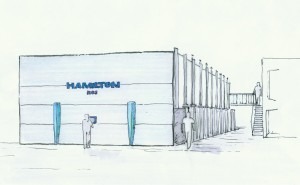
Eight million samples from a three-generation study will be managed by the BiOS system as part of university LifeLines project
Hamilton Storage Technologies has announced the sale of one of the first -80 degrees C BiOS third-generation automated storage systems to the LifeLines Study at the University Medical Center Groningen (UMCG) in the Netherlands.
LifeLines is a major three-generation population-based study of 165,000 residents of the Netherlands' Northern Provinces.
The study is based on UMCG's research focus on healthy ageing and seeks to identify universal risk factors, and their modifiers, for multifactorial diseases such as cardiovascular, diabetes, asthma/COPD and depression.
The new -80degC BiOS provides large-scale, ultra-low temperature storage of sensitive biological samples.
Delivery to LifeLines will be in early 2013.
LifeLines has already collected approximately three million samples and the Hamilton contract includes a system for transporting new samples, using special cassettes and chest freezers, from the central processing laboratory at the University Hospital to the central biorepository, which is about 6 km away.
By 2017, LifeLines expects to collect and store over eight million samples in the BiOS at -80 degrees C.
These samples include urine, plasma, serum, buffy coat and DNA.
The Hamilton Storage Technologies BiOS system ensures long-term sample viability with redundant cooling, along with sample picking at ultra-low temperatures.
'Sample safety was our foremost goal when we started the tender process,' said Marcel Bruinenberg, research laboratory manager at LifeLines.
'The technology in the Hamilton BiOS guarantees that the samples will never go above -65 degrees C, significantly lowering the risk of degradation.
Our goal is to keep samples viable for 30 years or longer.' 'The Netherlands and Northern European countries are very big in biobanking,' explained Dr Martin Frey, senior product manager of storage technologies at Hamilton Bonaduz, Switzerland.
'There is a sharp focus on sample quality and these countries are pushing for new levels of standardisation.' Even as recently as 10 years ago, most biobanks were not tracking samples temperatures over time.
Multiple freeze and defrost cycles, inherent with manual storage and sample picking, can cause samples to degrade.
This flexible, scalable system ensures the integrity of 250,000 to more than 10 million sample tubes at temperatures down to -85 degrees C.

